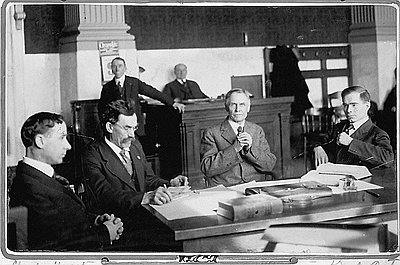This photograph of Senator Joseph R. McCarthy reading the Oregon Journal was taken on August 26, 1951, when he was in Oregon as the featured speaker at the state Republican Party picnic. The Wisconsin senator, who visited Oregon several times between 1950 and 1952, is best known for his anti-Communism and his pursuit of Communists in the federal government and the U.S. Army.
During the Cold War, many Americans were fearful of the Soviet Union, of communism in general, and of the atomic bomb, which the United States had used at the end of World War II and the Soviet Union had developed by 1949. Some American leaders worried that the U.S. government and the nation’s free-market economy were in danger.
In 1949, the Oregon Legislature prevented any person "linked to Communists" from working for the state. Some members of the U.S. Congress worked through the House Un-American Activities Committee (HUAC), which had been established in 1938, to bring people accused of being Communists before Congress.
In the United States, communism took the form of a social and political movement preoccupied with workers' rights and economic equity. The Communist Party often aligned itself with Populists, Socialists, and Democrats and with labor unions, such as the IWW. McCarthy conducted hearings that used the scare tactics employed by his colleagues on the HUAC in the House of Representatives. McCarthy's conflation of American communism and the Soviet Communist Party was disingenuous, and his curtailing of the civil liberties of American citizens had no apparent benefit to national security.
The June 1954 HUAC hearings in Portland resulted in the suspension of Professor Lloyd Reynolds and the firing of Professor Stanley Moore at Reed College, as well as firings and forced resignations by other local citizens who were accused of engaging in what the committee called "subversive" activities.
By the mid-1950s, McCarthy's influence had declined. The Supreme Court, led by Chief Justice Earl Warren, ruled the tactics used by HUAC to accuse and persecute alleged communists violated the U.S. Constitution. McCarthy's critics in the Senate formed the Watkins Committee to investigate the senator, which resulted into two votes of censure for violating Senate ethics and bringing the "Senate into dishonor and disrepute." McCarthy completed his term, but he was shunned by his colleagues.
Further reading:
Richard M. Fried, Nightmare in Red: The McCarthy Era in Perspective (New York: Oxford University Press, 1990)
Michael Munk, "Oregon Tests Academic Freedom in (Cold) Wartime: The Reed College Trustees versus Stanley Moore," Oregon Historical Quarterly 97:3 (Fall 1996): 262-354.
Written by Eliza Canty-Jones, © Oregon Historical Society, 2007. Updated 2023.


